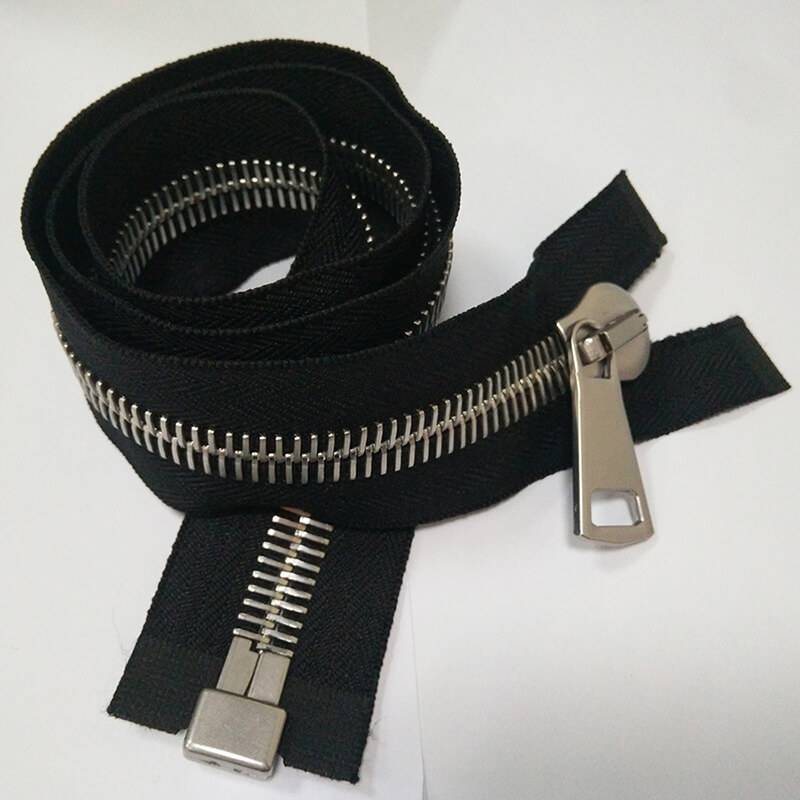Introduction
Metal zippers are a cornerstone in the textile industry, appreciated for their durability and aesthetic appeal. However, even the most robust zippers can occasionally present challenges, becoming sticky or difficult to use. Whether you're dealing with a stubborn zipper on a favorite jacket or a critical component in your latest design, knowing how to maintain and troubleshoot your zippers is crucial. This comprehensive guide delves into effective strategies to ensure your metal zippers remain smooth and long-lasting. By leveraging insights from seasoned professionals and using high-quality Wholesale Metal Zippers from reliable suppliers, you can significantly enhance the performance and longevity of your zipper mechanisms.
Thorough Cleaning for Optimal Zipper Functionality
● Importance of Cleaning Zippers
One of the foundational steps in maintaining smooth and durable metal zippers is regular cleaning. Dirt, debris, and natural oils can accumulate on zipper teeth over time, leading to impaired functionality. Keeping zippers clean prevents unnecessary wear and tear, thereby extending their lifespan.
● Tools and Materials for Cleaning
For effective cleaning, you'll need a few basic tools. A soft-bristle toothbrush, mild soap, and lukewarm water are ideal for cleaning most metal zippers. A small brush can reach between the teeth and remove accumulated grime without damaging the metal.
● Step-by-Step Cleaning Process
Begin by gently brushing off any loose dirt with a dry brush. Mix soap and water to create a light solution, then apply it to the zipper teeth using the toothbrush. Scrub gently, ensuring you cover all areas. Rinse thoroughly with clean water to remove soap residue, and allow the zipper to dry completely before use.
Effective Lubrication Techniques for Metal Zippers
● Types of Lubricants Suitable for Zippers
When cleaning isn't enough to restore functionality, lubrication can help zippers glide smoothly. There are several types of lubricants suitable for metal zippers, including beeswax, candle wax, and silicone spray. Each has its advantages and can be chosen based on availability and specific needs.
● Proper Application Methods
Apply your chosen lubricant sparingly. For wax-based lubricants, rub the product directly onto the zipper teeth. For silicone sprays, apply a light mist while ensuring thorough coverage. After applying, work the zipper up and down to ensure even distribution.
● Avoiding Over-application of Lubricant
While lubrication is beneficial, over-application can lead to a slippery zipper that won't stay in place. Always apply in moderation and wipe away excess lubricant with a soft cloth to maintain the right balance of smooth movement and functional grip.
Alternative Lubrication Methods: Pencil and Soap
● Using Graphite as a Dry Lubricant
Graphite, the core component of pencils, is an excellent dry lubricant. To use this method, simply rub the pencil tip along the zipper teeth, applying enough graphite to coat the metal. This provides a smooth finish and is particularly useful in emergencies when other lubricants aren't available.
● Benefits of Soap for Smooth Movement
A bar of soap is another handy alternative. Rubbing soap on the zipper teeth offers an immediate solution for stuck zippers. The soap acts as a lubricant, allowing the zipper to function with less resistance.
● Comparing Alternative Methods to Traditional Lubricants
While unconventional, these alternatives provide effective solutions when traditional lubricants are unavailable. However, for long-term maintenance, specialized zipper lubricants are recommended as they are formulated to prevent corrosion and offer prolonged efficacy.
Harnessing Heat to Enhance Zipper Mobility
● Safely Applying Heat to Metal Zippers
Heat can temporarily expand metal, alleviating stiffness in zippers. This method should be applied cautiously to prevent overheating, which can damage the fabric surrounding the zipper.
● Tools for Heating Zippers
A household hairdryer is perfect for applying gentle, controlled heat to a zipper. Alternatively, a warm, damp cloth can be used to transfer heat gradually. Always start with a low setting and gradually increase heat if necessary.
● Precautions to Prevent Damage
Never apply direct heat for extended periods. Move the heat source continuously to avoid concentrated hot spots. Monitor the fabric and zipper closely to prevent adverse effects from overheating.
Adjusting the Slider for Seamless Zipper Operation
● Identifying Problems with Slider Fit
A misaligned slider is a common cause of zipper issues. If the slider is too loose or tight, the zipper may not function properly. Identifying the slider as the problem can focus your efforts on this component.
● Tools for Adjusting Slider Tension
Simple tools such as pliers or tweezers are often all that's needed to adjust slider tension. Use these tools to gently tweak the slider until it grips the zipper teeth firmly without being too tight.
● Ensuring Long-term Slider Alignment
Regular adjustments and checks can prevent future slider issues. Ensure the slider fits snugly and the pull tab is in good condition, as this keeps the mechanism balanced and functional.
Replacing a Faulty Slider for Improved Performance
● Signs of a Damaged Slider
Visible signs of wear, such as bent or warped sliders, or visible damage to the pull tab, indicate it's time for a replacement. Catching these signs early can prevent more extensive zipper damage.
● Step-by-Step Slider Replacement Guide
To replace a slider, gently pry the old one off the zipper teeth using pliers. Slide a new slider on, matching the direction and orientation of the previous one. Test the new slider to ensure it moves smoothly across the zipper teeth.
● Selecting the Right Size and Type of Slider
Choosing a slider that matches the zipper in size and style is crucial for proper function. Consider consulting a wholesale metal zipper supplier for options that suit your specific needs.
When to Replace the Entire Zipper: A Guide
● Assessing the Need for Complete Zipper Replacement
If cleaning, lubrication, and slider adjustments don't resolve zipper issues, a full replacement may be necessary. Evaluate the entire length of the zipper for extensive wear or damage before deciding.
● Basic Sewing Skills for Zipper Replacement
Replacing a zipper requires basic sewing skills. Removing the old zipper, aligning the new one, and sewing it securely into place are essential steps. A meticulously replaced zipper can restore both functionality and aesthetic appeal.
● Choosing the Right Replacement Zipper
Selecting a high-quality replacement helps ensure long-lasting performance. Wholesale metal zipper suppliers offer a range of options, providing the durability and style necessary for various applications.
Preventive Maintenance for Long-lasting Zippers
● Routine Checks and Cleaning Practices
Regular checks for dirt accumulation or wear can prevent serious zipper problems. Implement a cleaning routine based on frequency of use, and address any emerging issues promptly.
● Storing Items with Zippers Properly
When storing items with zippers, ensure they are fully closed and stored in a dry environment. This reduces the risk of damage and prolongs the zipper's lifespan.
● Best Practices for Zipper Longevity
Consistent maintenance and careful handling are key. Avoid forcing stuck zippers and apply lubrication periodically to keep them functioning smoothly, especially in high-use items.
Troubleshooting Common Zipper Issues
● Identifying Frequent Zipper Problems
Common issues include stuck sliders, missing teeth, and misalignment. Being able to quickly identify these problems aids in prompt and efficient repairs.
● Quick Fixes and Long-term Solutions
While temporary solutions can address immediate problems, implementing long-term measures like regular maintenance can prevent future issues. Maintaining a toolkit with essential repair items can assist in on-the-spot fixes.
● Preventive Measures to Avoid Future Issues
Incorporating preventive strategies such as proper lubrication, regular inspections, and gentle handling significantly reduces the likelihood of zipper difficulties down the line.
Resources for High-Quality Zipper Products
● Finding Reliable Zipper Suppliers
Selecting a reputable wholesale metal zipper supplier is critical. With a dependable source, access to high-quality products ensures reliability and durability in your applications.
● Overview of Available Zipper Accessories
Wholesale metal zipper suppliers offer a variety of accessories, including sliders, top stops, and bottom stops. Understanding the full range of available components can enhance your ability to conduct repairs and replacements effectively.
● Customer Reviews and Recommendations
Before committing to a supplier, examine customer reviews and seek recommendations. Feedback from previous buyers can provide valuable insights into the quality and service of a supplier.
Conclusion
Maintaining smooth, durable metal zippers requires a combination of regular cleaning, strategic lubrication, and prompt repairs. By following these expert tips, you can keep your zippers in optimal condition, ensuring longevity and functionality. Relying on top-quality products from trusted wholesale metal zipper suppliers further guarantees the reliability and performance of your zippers.
Company
Introduction
ABS Zhejiang Chuangfa Zipper Technology Co., LTD. was founded in 2011 and specializes in the production, sale, and service of zippers and buttons. Located in the Zhejiang Haining Industrial Zone, the company benefits from excellent transport links. Known for exporting a wide range of products globally, ABS Zipper is renowned both domestically and internationally. ABS is a registered brand in 102 countries, with products suitable for diverse applications, including clothing, shoes, bags, and more. Committed to quality and innovation, ABS Zipper offers both OEM and ODM solutions, maintaining a leading position in the zipper industry.












